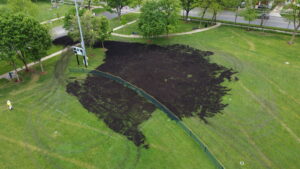
For the seventh year, the River Forest Park District (RFPD) will manage its fields and grounds free of environmental and health concerns for children, pets and wildlife by not applying lawn pesticides.
“The Park District strives to keep our parks a healthy place for everyone to enjoy,” said Michael Sletten, RFPD’s Executive Director. “We hope all River Forest residents follow the Park District’s example, using natural lawn care (NLC) techniques in an effort to keep their lawn safe and healthy.”
To disrupt the life cycle of pests and weeds its parks, the RFPD has heightened its mowing practices, implemented a core aeration program for the spring and fall and instituted an 100% organic fertilization program.
“RFPD’s NLC approach addresses the root causes of weed and pest problems such as poor soil drainage, nutrient deficiency or soil compaction, as opposed to the symptoms of just applying a weed or pest killing product,” said Ryan Anderson, the Community IPM Manager for the non-profit IPM Institute of North America.
The IPM Institute’s Midwest Grows Green (MGG) sustainable landscaping initiative provided extensive support to the RFPD to improve turfgrass performance on Keystone and Priory Parks without synthetic pesticide and fertilizer applications. The RFPD and MGG topdressed both parks with locally-sourced compost to create rich, vibrant soil, the essential building block for healthy grass.
“We are thrilled that the RFPD is using natural lawn care to maintain our green spaces free of potentially harmful chemicals,” added Cary McLean, the River Forest Sustainability Commissioner responsible for Healthy Lawn, Healthy Family advocacy and community engagement.
To learn more about natural lawn care and apply these practices to your own lawn, please visit and take the MGG pledge at bit.ly/MGGpldg or visit MGG’s newest resource for pesticide reduction strategies on sports fields at LawnandLand.org.
A couple of easy steps to manage your lawn naturally, effectively, and safely include:
- Water Deeply and Infrequently: This encourages deep root growth. Aim for one inch per week. You can easily measure that amount by placing a cup in your yard while watering. You’re done watering for the week when the cup fills one inch deep. Water early in the morning to minimize disease problems.
- Mow High: Keep your lawn mowed at three inches or higher. This increases root strength and naturally shades out weeds, so your grass withstands drought and stays green longer. Don’t mow unless needed.
- Use Organic Fertilizer: Commercial fertilizers easily wash away, polluting nearby lakes and streams. Many contain toxic weed killers. Choose an organic fertilizer to capture and deliver nutrients in the lawn throughout the growing season. Keep grass clippings on the lawn as they provide an excellent natural fertilizer.
- Weed Naturally: Proper lawn care maintenance naturally eliminates most weeds. Annual reseeding gives grass an advantage over weeds. Avoid using pesticides, as they can harm other beneficial living things such as bees, worms, and birds. The right tool makes quick work of weeding. After pulling weeds, use grass seed and soil to fill in the hole. Your grass will grow strong and healthy as a result.
About Midwest Grows Green
Midwest Grows Green is an initiative of the IPM Institute of North America, Inc. that accomplishes large scale behavior change by sharing pesticide and fertilizer reduction information at critical places where lawns influence our lives. The IPM Institute is an independent 501(c)3 non-profit started in 1998 that improves sustainability in agriculture and communities through market mechanisms based in Integrated Pest Management.
